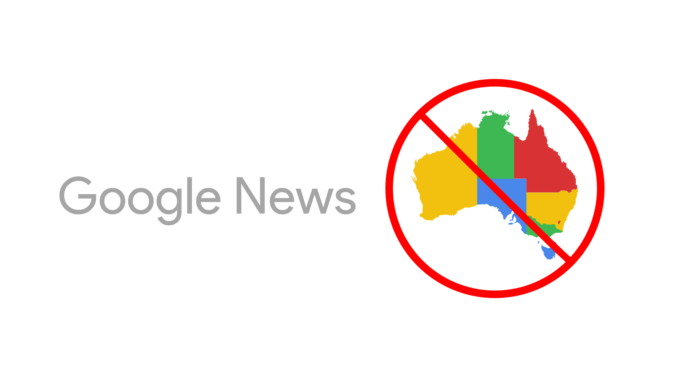In a time when Google would want to be painting itself as the innocent party, targeted unnecessarily by government intervention, the company has shot a massive own-goal in Australia this week.
Unsurprisingly, big media aren’t missing the opportunity to call out Google’s rather mind boggling behaviour. This week, publishers including Fairfax, News Ltd and The Guardian have noticed that Australian news stories have been hidden (or at least buried) in Australian search results.
Google confirmed that it was “running an experiment” until early February 2021, but the actual purpose of the experiment is unclear. Google says the experiment will affect around 1% of Google search users in Australia, ideally to measure the impacts of news business and Google search on each other. More likely, though, it seems the experiment is a vision of what’s to come if Google is forced to pay Australian publishers to link to their content – the links (and the consequent referral traffic) will simply disappear.
Unfortunately, it seems that these experiments couldn’t have come at a worse time. Google is facing proposed regulation from the federal government which will require Google (and Facebook) to enter into good-faith bargaining with major news publishers to ensure those publishers are paid for their journalism.
(Ed. In interests of full disclosure, Ausdroid will not be included in coverage of the draft regulation, and we are unsure exactly how our business will be impacted).
The fear is that, faced with the choice of paying news publishers for content or not being able to carry that content in Australia, Google might look at its own actions overseas and pull the news product out of Australia entirely, which would decimate the local news landscape.
Google, for its part, contends that the media landscape in Australia is not dependent on it for coverage, an assertion which most in small media (and probably large) would disagree with. One need only look at the volume of traffic that comes to sites big and small to recognise Google’s impact here – without it, lots of smaller news publishers will disappear overnight.
Whether Google should be paying publishers to link to and refer traffic their way is quite something else, and those with an interest in how the Internet is meant to work would probably agree that this move is stupid.
Google News does not host news content generated by publishers; it merely signposts it (sometimes with a sentence or two snippet) so users can redirect off to the publisher’s page to read it. In this manner, publishers already get paid because they earn advertising revenues off those views.
Seeking to be paid by Google too seems like greed more than anything else, and – if it ends up happening – may have a chilling effect on how search engines like Google, Bing and others operate.
It’s a time when Google would want to be ingratiating itself with users, publishers and governments alike … and this “experiment” seems to have done anything but.
Google has demonstrated just how easily it could make Australian news businesses effectively disappear from the internet, demonstrating their extraordinary – and probably undesirable – market power.
Granted, this isn’t exactly what the proposed media code is designed to address, but it’s almost certain to attract the ire of publishers and governments and – if not careful – could lead to even further regulation down the track.
Fortunately, perhaps, for Google the second draft of the code recognises the value that news publishers get from Google referral traffic, acknowledging that it isn’t purely a benefit for Google.
Unfortunately, though, the arbitration clauses are still present in the code, which would require publishers who cannot reach good faith agreements with Google and Facebook to submit to arbitration where a payment figure would be awarded.





I’m pretty glad that they’ve shown that they can do it, without stuffing up the search engine for it’s primary purpose: finding things on web pages. I was a bit worried that it would be technically infeasible, and they would conclude that removing search from Australia would be the only option. It can’t be easy to algorithmically determine what would count as “news”, especially given the meaningless dreck that passes for editorial in this country, on the major mastheads. The proposed rule doesn’t stop at content hosted at specific Australian news sites, but rather content that an average Australian would… Read more »
a) Google is a Private company. If they want to test how their product works in different situations, its up to them. b) If the Mainstream media’s contention is that Google is stealing their content, why would they have any issue if Google look at what it would be like to not steal the content? c) Could it be that the ms media need Google more than they like to admit? So don’t see how this is an own goal? The Media all ready hate google because google ate their lunch because its a better product! The Government already hate… Read more »
Point A. That Google did this search results hiding experiment, in secret, while continuously screeching in Chicken Little fashion that ‘Da Interwebz Will Cave In!1!’ if Australia makes them pay for what they steal from the content sites. The result of their being caught doing this, shows that they are money and power hungry hypocrites. Point B. That’s just it, Google _hid_ the content from search results, and _STILL_ continued stealing the content and did not pay a brass razoo for it. Google are doing their damndest to prevent ANY legal toehold, to require them to pay for what they… Read more »
Hey Jeni, there’s really only one point that I’d note here – Google don’t “steal” content; they index it and link to it the same as they would do for any other SER – can’t link to content if you can’t identify the content. Perhaps there’s some argument around whether they should be hosting excerpts or header images etc, but I would argue it benefits media extensively to have Google do this – it drives a LOT of traffic towards online media that they’d otherwise not get. I think the MSM needs to realise they benefit from Google News, not… Read more »
I think the issue is the amount of content that Google can excerpt and monetise from. I know that when Im skimming news content – I can quite often get an idea from the summary paragraph and won’t go on to read the entire article. If all of that content has been skimmed and is sitting on Google Search or in Google News it drives nothing to the provider of the content – who have staff to pay to create that material! The point is that Google aren’t exactly on the skids – they are worth likely thousands of times… Read more »
I don’t disagree Richard, but there’s a few areas where this is relevant. Google News (as distinct from Search) doesn’t show excerpts, only titles and (sometimes) a thumbnail image. Google Search typically does not show excerpts for AMP articles (which most major news sites use), just a title and thumb again. For standard search engine results, though, a snippet is shown but in the same way any other search engine result shows a snippet. It isn’t particular to media by any means. If we’re suggesting that Google should pay for reproducting THAT snippet in a search result, well then every… Read more »
It’s an own goal in the sense that Google wants to avoid regulation, and just did something that may very well draw the ire of those who may seek further regulation in future. It’s also not a private company, it’s a public one… but the point is moot 😉 Yes, Google can and probably should look at what its products will look like if this regulation comes to pass .. but giving the MSM ammunition to be (even more) critical of Google doesn’t seem wise. I think everyone knows that media (us included) needs Google a hell of a lot… Read more »
I’m not entirely sure it’s an own goal. Google just demonstrated that they are seriously investigating not using the content rather than pay for it. In other words, they just gave a taste of how strong their hand is in negotiations.
This little experiment should provide real world data regarding the benefits to the affected media companies from Google providing links to their sites’ content that can be used in the “good faith” bargaining. One could easily envisage a measurable decline in their site hits, with consequential decline in advertising revenue from that decline in traffic. It has (potentially) taken a theoretical future situation and made it real. Maybe it’ll kick some sense into things, though I doubt it.
Unlikely to be a long term impact. If Google are dumb enough to pull Search out of the Australian market, they will lose billions in revenue. There are alternatives – Bing is not so bad really (although not Google I know!). Other companies will step in to fill the gaps. Users will learn to accommodate the changes even if they dont like it. I was just looking this morning at alternatives to GA and came across Metamo. It actually looks to be potentially more useful than GA – and Im going to trial it. If Google hadn’t played bully games… Read more »
Good points Richard. We’ve tried Matomo analytics before and while it works OK, it’s definitely not as easy to use as GA.
However, with a bit of leg work, it wouldn’t be hard to make a like for like swap, and the resulting figures are (as you’d expect) broadly the same and easily reportable.
Point B was exactly my first thought. And point C my second!